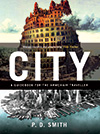WILL Radio: The Afternoon Magazine
14 September 2007 | atomic bomb, Doomsday Machine, Doomsday Men, H-bomb, Haber, Kahn, Szilard, WW2 | 7 comments
Bill Hammack of WILL Radio’s 'The Afternoon Magazine' has interviewed me about Doomsday Men. It was a wide-ranging discussion lasting 45 minutes, with calls from listeners in the US - I've never been on a phone-in before so this was an interesting experience! We talked about Leo Szilard, Edward Teller, Herman Kahn, Fritz Haber, and the Doomsday Machine, which seems to have been provoking some comment stateside recently (e.g. Slate, Wired, Question Technology).
You can listen to the interview here (MP3).
By the way, if you can read German, there's also an interesting article about my book and the Soviet "Doomsday Machine", Perimetr, on Telepolis.


Paul Halpern | 14 September 2007
Fascinating interview. I enjoyed it very much, particularly your insights and anecdotes about Szilard, Kahn and others.
PD Smith | 15 September 2007
Thanks Paul - glad you liked it!
Thomas R. | 27 September 2007
The book suggests that the leading scientists of that time somehow identified those SF-stories which really prognosed later developments. What read contemporary leading scientists and what idea of the future give their readings?
PD Smith | 28 September 2007
My book explores many examples of fiction in the first half of the 20th century that helped to create the "dream of the superweapon". Briefly, these showed how a "saviour scientist" would emerge from his laboratory with a weapon so powerful that no army could resist it. In this way war would effectively be abolished and science would have helped to bring about a utopia.
HG Wells' "The World Set Free" (1914) is a key text in that it predicts an atomic superweapon, global nuclear war, and an atomic utopia. It influenced one of the fathers of the atomic age, Leo Szilard, when he realised that a self-sustaining neutron chain reaction was the key to atomic energy in 1933.
Hope this helps! There are many other influential texts though in the book...
Thomas R. | 28 September 2007
Hi Peter, thanks! If I would try a prognosis about recent influential SF, I would point to Stanislav Lems books. Conc. fiction-stories about future social and polit. developments, when one such story catched my attention and I found out that the author (a physicist and philosopher) wrote it after visiting a leading institute which produces many leading buerocrats and politicians, I made a little experiment, made a brochure in the style of that SF for a group of politics advisors and finaly gave it a unique symbolic name from out of novel, then send it to the target group. The feedback was very interesting...
PD Smith | 30 September 2007
...so I guess they fell for it then? That's the kind of trick Leo Szilard would have pulled!
Thomas R. | 30 September 2007
Well, we live in a strange world. Academia does not differ: Once, a student (phoning me at 3 a.m. for it) took a joke as thesis-theme he offered his prof and got it admitted. Imagine his reaction, when he asked later the day for further ideas and found out.